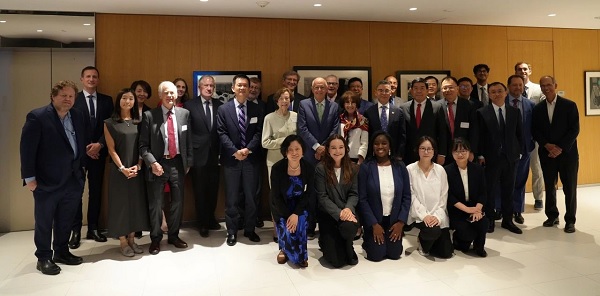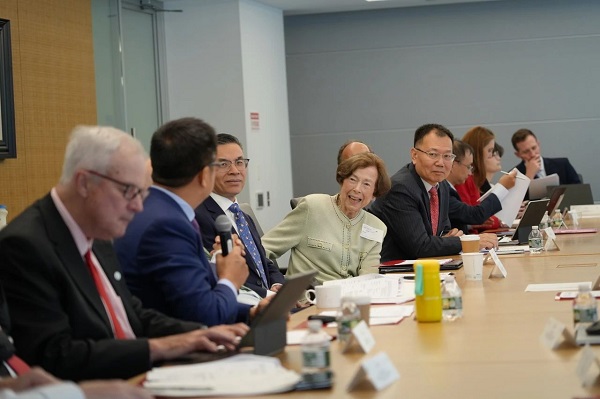The "U.S.-China Track II Economic Dialogue" convened successfully in New York from July 21-24, 2025, bringing together leading economic and financial experts from both nations. Co-hosted by the Shanghai Advanced Institute of Finance (SAIF) at Shanghai Jiao Tong University and the National Committee on U.S.-China Relations (NCUSCR), this prestigious exchange mechanism continues to foster critical dialogue between China and the United States during increasingly complex global circumstances.

Distinguished Delegations
The Chinese delegation was led by Cheng Shijun, Executive Dean and Chair Professor of Accounting at SAIF, and Yang Yao, Dean of the Dishui Lake Advanced Institute for Financial Studies at Shanghai University of Finance and Economics and Visiting Professor at Peking University. The delegation comprised distinguished academics and industry leaders including Haitao Yin, Executive Dean of the ESG Research Institute and Director of International Affairs at SJTU; Hong Yan, Deputy Dean of Academic Affairs and Chair Professor of Finance at SAIF; Feng Li, Deputy Dean and Chair Professor of Accounting at SAIF; Xiaoyun Yu, Chair Professor of Finance at SAIF; Haizhou Huang, Distinguished Visiting Professor at SAIF and Member of the Monetary Policy Committee of the People's Bank of China; Ye Zhou, SAIF alumnus, Founder, Chairman and CEO of Huifu Payment, and Affiliate Professor at SAIF; and Mingchun Sun, Vice Chairman of the Chinese Finance Association of Hong Kong and SAIF Guest Professor.
The U.S. delegation featured equally prominent figures, including Charlene Barshefsky, Chair of NCUSCR, Chair of Parkside Global Advisors, and Former U.S. Trade Representative; Johanna Chua, Managing Director at Citigroup; Robert Dohner, Senior Advisor, The Mountain Pacific Group and Former Deputy Assistant Secretary for Asia at the U.S. Department of Treasury; Carla A. Hills, Chairman and Chief Executive Officer of Hills & Company, Former U.S. Trade Representative, and Honorary Chair of NCUSCR; Constance Hunter, Chief Economist of The Economist Intelligence Unit; Nicholas R. Lardy, Nonresident Senior Fellow of Peterson Institute for International Economics; Zongyuan Zoe Liu, Maurice R. Greenberg Senior Fellow for China Studies at the Council on Foreign Relations; Tom Manning, Former Chairman & CEO of Dun & Bradstreet; Barry Naughton, So Kwan Lok Chair of Chinese International Affairs and Professor of Economics at the Graduate School of International Relations and Pacific Studies, University of California, San Diego; Stephen A. Orlins, President of NCUSCR; Daniel H. Rosen, Co-Founder and China Practice Leader of Rhodium Group; Ernie Thrasher, Chief Executive Officer of Xcoal Energy & Resources; Jan van Eck, Chief Executive Officer of VanEck; and Mark M. Zandi, Chief Economist at Moody's Analytics.

Substantive Dialogue and Engagement
The dialogue commenced with a welcome luncheon on July 21, where former U.S. Treasury Secretary Robert Rubin met with participants, setting a tone of high-level engagement. During the intensive closed-door sessions on July 21-22, both Cheng Shijun and Charlene Barshefsky delivered opening remarks emphasizing the critical importance of sustained China-U.S. dialogue for global economic stability in the current challenging international environment.
The substantive discussions centered on three pivotal themes: "Economic Outlook and Policy Prospects for 2025 and Beyond," "Prospects for U.S.-China Relations in Terms of Trade and Economic Relations," and "The Future of U.S.-China Economic Coexistence: Challenges and Possible Areas of Cooperation." Participants engaged in frank exchanges on pressing contemporary issues including tariff policies, artificial intelligence developments, and stablecoin regulation.
On July 23-24, the Chinese delegation conducted strategic visits to key New York institutions including VanEck, the Council on Foreign Relations, the Chinese Finance Association, and the Asia Society. These engagements provided valuable opportunities for in-depth discussions with industry professionals regarding the current trajectory of U.S.-China economic relations and emerging bilateral opportunities.
A Platform for Enduring Partnership
The "U.S.-China Track II Economic Dialogue" represents a cornerstone of bilateral academic and business engagement, having convened biannually since its inception in January 2010, alternating between venues in China and the United States. This vital forum enables scholars, business leaders, and other stakeholders from both nations to address long-term challenges in U.S.-China financial and trade relations while examining their broader implications for the global economic landscape. The dialogue serves as an essential bridge, helping academic and business communities understand and build upon the outcomes of official governmental discussions while fostering deeper mutual understanding and trust between the peoples of both countries.
SAIF's active participation in this dialogue demonstrates the institute's commitment to international engagement and its unique position to facilitate enhanced communication and cooperation between Chinese and American academic and business communities.
About SAIF
The Shanghai Advanced Institute of Finance was established through a strategic partnership between the Shanghai Municipal Government and Shanghai Jiao Tong University, following the model of world-renowned business schools. The institute serves as a cornerstone institution supporting Shanghai's development as a global financial center, aligning with China's broader national financial strategy.
Since its founding in 2009, SAIF has distinguished itself as a premier financial institution in China, dedicated to achieving world-class excellence in finance and management research and education. The institute remains committed to advancing high-level academic exchanges and providing evidence-based policy recommendations that support societal development and economic progress.
Looking forward, SAIF will continue leveraging its distinguished expertise in financial and economic research, actively participating in prestigious international forums such as the "U.S.-China Track II Economic Dialogue" to contribute meaningfully to China's continued opening-up, international cooperation, and Shanghai's emergence as a leading global financial center.
About NCUSCR
The National Committee on United States-China Relations stands as a distinguished non-profit educational organization dedicated to fostering mutual understanding between the citizens of China and the United States. The Committee's extensive experience and deep relationships with senior officials and distinguished citizens of both nations position it as a unique and invaluable national resource.
Since its establishment, NCUSCR has championed thoughtful discourse within American society regarding China and U.S.-China relations, with comprehensive information dissemination and public education serving as its foundational activities. A pivotal moment in the organization's history came in 1972 when NCUSCR successfully hosted the Chinese table tennis team's groundbreaking visit to the United States, establishing the Committee as a leading institution in bilateral policy exchange. Since the 1980s, NCUSCR has focused on cultivating enduring and substantive exchanges between influential leaders in both China and the United States.
In today's interconnected world, where global and local interests are increasingly intertwined, the importance of maintaining open and productive communication channels has never been more critical. NCUSCR currently encompasses over 750 members across the United States and nearly 100 companies and professional firms, all united by a fundamental conviction: that healthy and productive U.S.-China relations serve the essential interests of both nations and the broader global community.






